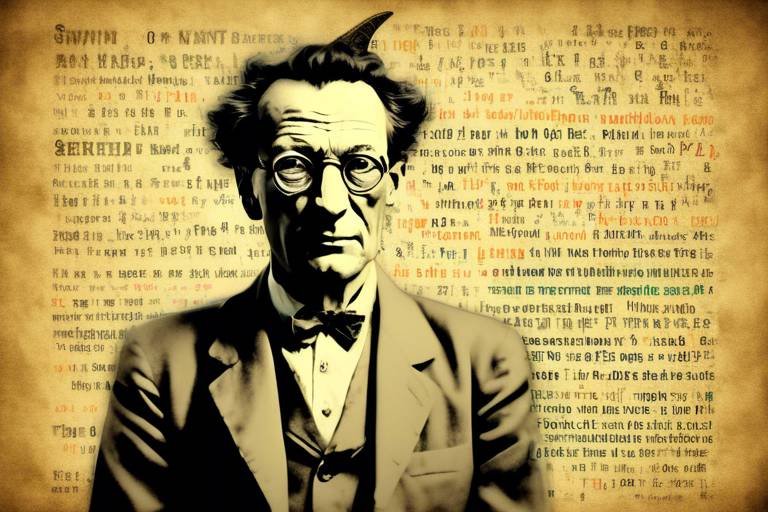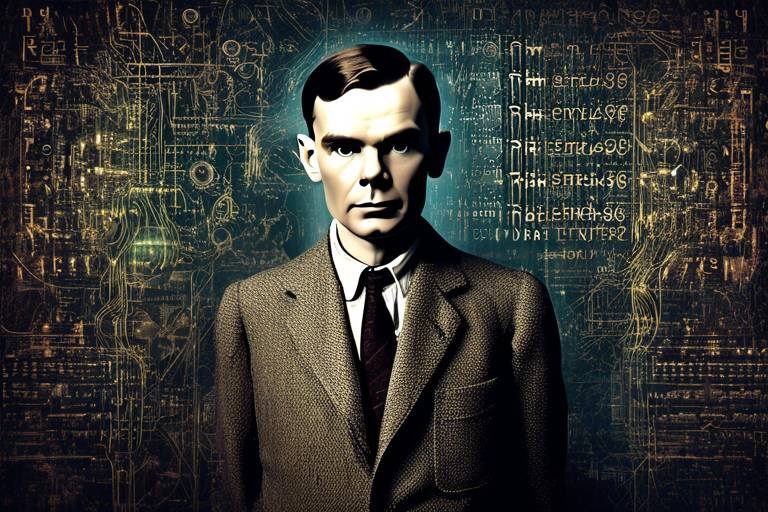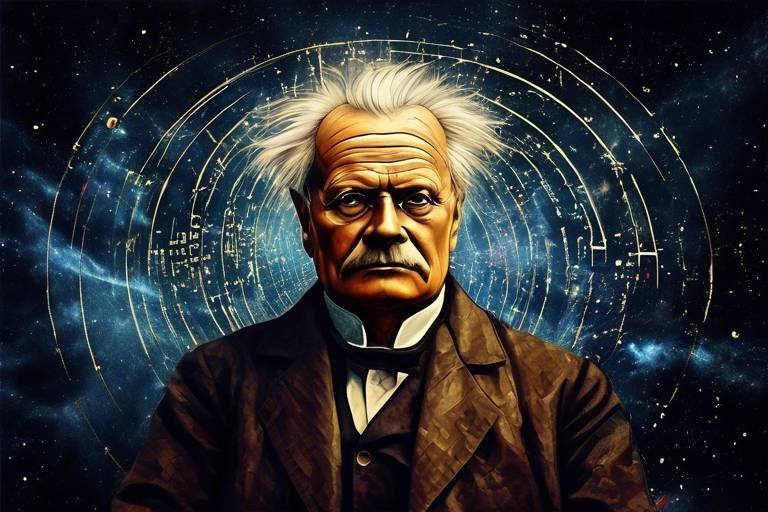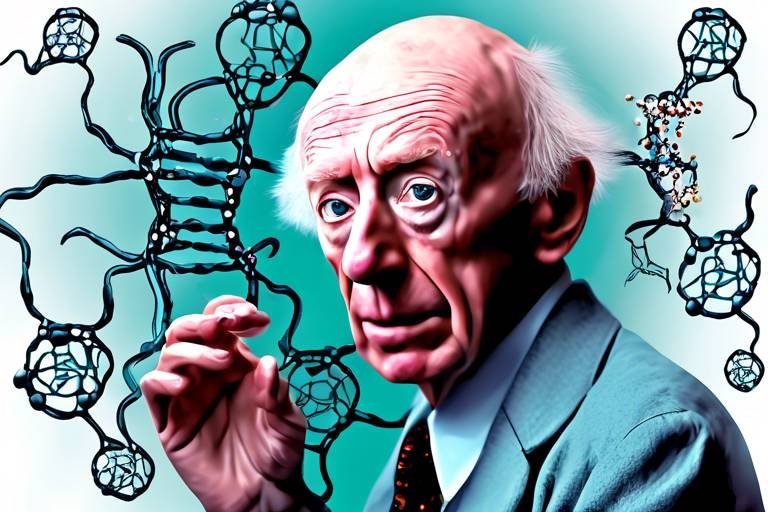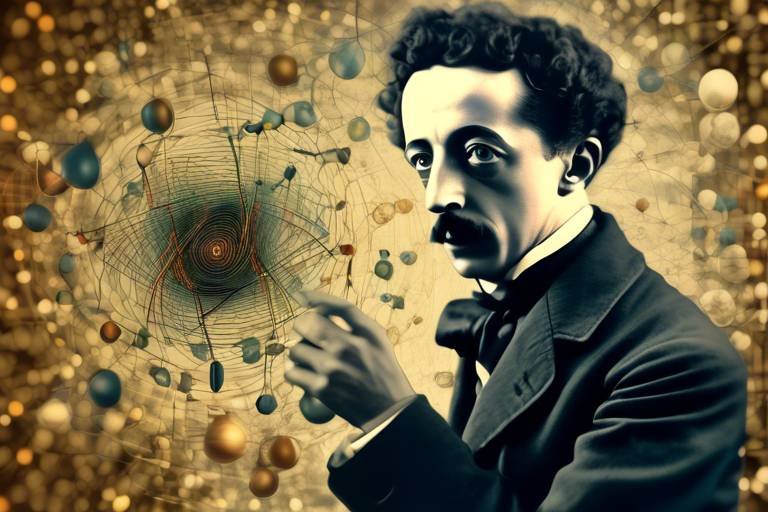The Discoveries of Niels Henrik Abel in Mathematics
Niels Henrik Abel, a name that resonates through the corridors of mathematical history, is often remembered as a pioneer whose groundbreaking contributions have left an indelible mark on the fields of algebra and analysis. Born in Norway in 1802, Abel's journey through the world of mathematics was not just a personal quest; it was a transformative period that reshaped the landscape of mathematical thought. Imagine a time when the very foundations of algebra were being questioned, and the limits of mathematical understanding were being pushed. Abel stood at the forefront of this revolution, challenging the status quo and paving the way for future generations of mathematicians.
Abel's work was characterized by a remarkable blend of creativity and rigor. He tackled problems that many of his contemporaries deemed insurmountable, and his innovative approach to mathematics was nothing short of revolutionary. His passion for solving complex problems was evident from a young age, and despite facing numerous obstacles, including financial difficulties and health issues, he persevered. This determination not only fueled his own success but also inspired those around him, making him a beacon of hope in the mathematical community.
As we delve deeper into Abel's contributions, we see that his influence extends far beyond his lifetime. His insights into the convergence of infinite series, encapsulated in what is now known as Abel's Theorem, have become fundamental in modern analysis. This theorem is not merely an abstract concept; it has tangible applications that resonate in various fields, including physics and engineering. Abel's ability to connect abstract mathematical theories with practical applications is a testament to his genius.
In Abel's world, mathematics was not just about numbers and equations; it was a language that described the universe. His legacy continues to inspire mathematicians today, reminding us that the pursuit of knowledge is a journey filled with challenges and triumphs. As we explore the depths of his discoveries, we uncover not just the brilliance of his mind, but also the spirit of innovation that drives mathematics forward.
- What is Abel's Theorem?
Abel's Theorem addresses the convergence of infinite series, providing crucial insights into the behavior of functions and their series representations. - How did Abel influence modern mathematics?
Abel's work laid the groundwork for many areas of mathematics, particularly in algebra and analysis, influencing countless mathematicians and researchers. - What is the Abel Prize?
The Abel Prize is an award established in 2001 to honor outstanding contributions to the field of mathematics, named in memory of Niels Henrik Abel. - Why is Niels Henrik Abel considered a significant figure in mathematics?
Abel is celebrated for his innovative ideas and theorems that challenged existing mathematical paradigms, particularly in the theory of equations.

Early Life and Education
Niels Henrik Abel was born on August 5, 1802, in the small Norwegian town of Finnøy. From a young age, he exhibited a remarkable aptitude for mathematics, often immersing himself in complex problems that would baffle his peers. Despite growing up in a modest household, where financial constraints were a constant struggle, Abel’s passion for learning shone brightly. His father, a priest, recognized his son’s talent and encouraged him to pursue his interests, even if it meant sacrificing material comforts.
Abel's early education was primarily conducted at home, where he was introduced to various mathematical concepts through self-study and guidance from his father. However, as he grew older, it became evident that he needed formal education to fully realize his potential. At the age of 15, he enrolled at the University of Oslo, where he began to delve deeper into the world of mathematics. Here, he was exposed to the works of prominent mathematicians, which further fueled his desire to explore uncharted territories in the field.
During his time at the university, Abel faced numerous challenges, including financial difficulties that often hindered his studies. To support himself, he took on tutoring jobs, sharing his knowledge with younger students. This experience not only solidified his understanding of mathematical principles but also honed his ability to communicate complex ideas in a relatable manner.
After completing his studies in Norway, Abel moved to Germany, where he encountered a vibrant mathematical community. This transition was pivotal; he interacted with renowned mathematicians such as Carl Friedrich Gauss and Johann Carl Friedrich von Neumann. These relationships were instrumental in shaping his innovative thinking and problem-solving skills. Abel's time in Germany exposed him to new ideas and methodologies, allowing him to refine his own mathematical theories.
Throughout his educational journey, Abel remained undeterred by the obstacles he faced. His relentless pursuit of knowledge and his unwavering belief in his abilities ultimately laid the groundwork for his groundbreaking contributions to mathematics. In the face of adversity, he emerged not just as a student, but as a visionary thinker whose work would influence generations to come.
In summary, Niels Henrik Abel's early life and education were characterized by a profound passion for mathematics, a supportive yet challenging environment, and a relentless pursuit of knowledge. His experiences shaped him into a mathematician capable of making revolutionary contributions, setting the stage for his later achievements in the field.

Abel's Theorem
Niels Henrik Abel's contributions to mathematics are often encapsulated in what is known as . This theorem serves as a crucial cornerstone in the field of analysis, particularly concerning the convergence of infinite series. To put it simply, it helps mathematicians understand whether an infinite sum can be assigned a finite value. Imagine trying to fill a bathtub with water from a garden hose; if the water flows in infinitely, how do you determine when the tub is full? Abel’s Theorem provides the mathematical tools to answer such questions in a rigorous way.
At its core, Abel's Theorem states that if a series converges, then the sum of its terms approaches a specific limit as you add more and more terms. This foundational principle has profound implications across various branches of mathematics, including calculus and complex analysis. For instance, it finds applications in determining the convergence of power series, which are essential for representing functions in a manageable form.
To illustrate the theorem's significance, consider the following scenario: you have a series of numbers that you want to sum, but some terms are negative. Abel's Theorem allows you to analyze the series and determine whether the sum approaches a finite number or diverges to infinity. This is crucial in many areas of mathematical research, especially when dealing with complex functions and their behaviors.
The proof of Abel's Theorem is a testament to Abel's ingenuity and meticulousness. It involves a deep dive into the analysis of series and their convergence properties. Abel approached the proof with a combination of rigorous logic and creative insight, showcasing his profound understanding of mathematical principles. The proof itself can be quite intricate, requiring a solid grasp of limits and continuity. In essence, it demonstrates that if a series converges, then it must also converge uniformly under certain conditions.
Abel's Theorem has numerous applications in modern mathematics. Here are a few key areas where it holds significant relevance:
- Power Series: Abel's Theorem is instrumental in studying the convergence of power series, which are essential for function representation.
- Complex Analysis: The theorem helps in understanding the behavior of complex functions, particularly in determining their convergence properties.
- Numerical Analysis: It aids in the approximation of functions, which is crucial for computational mathematics.
The relevance of Abel's Theorem continues to influence contemporary mathematical research and education. It serves as a fundamental building block for further explorations into the realms of analysis and algebra.
Understanding the historical context of Abel's Theorem provides valuable insight into its significance. During the early 19th century, many mathematicians were grappling with similar problems related to series and convergence. Abel's work offered a fresh perspective, breaking new ground in a field that was still in its infancy. His innovative approach not only solved existing problems but also paved the way for future developments in mathematics.

Proof of the Theorem
Niels Henrik Abel's proof of his eponymous theorem is a dazzling display of mathematical ingenuity. At its core, Abel's Theorem addresses the convergence of infinite series, a concept that can seem daunting at first glance. To understand this theorem, one must grasp the delicate balance between the terms of a series and their behavior as they approach infinity. Abel approached this challenge with a meticulousness that is both inspiring and instructive.
To illustrate the essence of his proof, Abel employed the concept of **uniform convergence**. This idea is crucial because it allows mathematicians to interchange limits and sums under certain conditions, which simplifies the analysis of series. Abel's work demonstrated that if a series converges uniformly, then the limit of the series can be exchanged with the sum of its terms. This breakthrough not only clarified the conditions under which series converge but also laid the groundwork for future explorations in analysis.
One of the key components of his proof involves examining the nature of power series. Abel showed that if a power series converges at a particular point, it converges uniformly within a certain radius. This result is foundational in complex analysis and has applications in various fields, including physics and engineering. Abel's approach can be summarized through the following steps:
- **Establishing the series**: Abel began by defining a power series and its radius of convergence.
- **Analyzing convergence**: He meticulously analyzed the behavior of the series at the boundary of its convergence.
- **Applying the uniform convergence theorem**: By applying the uniform convergence theorem, he proved that the series converges uniformly within its radius.
This proof not only showcased Abel's deep understanding of mathematical principles but also highlighted his ability to connect different areas of mathematics. The clarity and depth of his arguments resonate even today, as they continue to influence the study of series and functions. Abel's work serves as a reminder that the beauty of mathematics often lies in its ability to reveal profound truths through rigorous reasoning.
In conclusion, the proof of Abel's Theorem is a testament to his brilliance and dedication to the field of mathematics. It opened doors to new methodologies and established a framework that continues to guide mathematicians in their quest for knowledge. Abel's legacy is not merely in the theorem itself but in the inspiration it provides to generations of mathematicians who strive to understand the complexities of infinite series.
- What is Abel's Theorem?
Abel's Theorem is a fundamental result in mathematics that deals with the convergence of infinite series, particularly focusing on power series and their behavior.
- Why is the proof of Abel's Theorem significant?
The proof is significant because it established important principles regarding uniform convergence, which have far-reaching implications in analysis and other mathematical fields.
- How did Abel's work influence modern mathematics?
Abel's work laid the groundwork for future developments in algebra and analysis, influencing many mathematicians and contributing to the evolution of mathematical thought.

Applications in Modern Mathematics
Niels Henrik Abel's contributions to mathematics, particularly through his remarkable theorem, have had a profound impact on various fields. One of the most significant applications of Abel's Theorem is in the realm of power series. Power series are essential tools in mathematical analysis, allowing mathematicians to represent functions as infinite sums of terms. By understanding the convergence properties of these series, researchers can determine the conditions under which a power series converges to a specific function, which is crucial in both theoretical and applied mathematics.
Moreover, Abel's insights extend to complex analysis, where the behavior of functions defined by power series is analyzed in the complex plane. The theorem helps in establishing the convergence of series in complex domains, which is vital for many applications in engineering and physics. For instance, in signal processing, the Fourier series—a type of power series—is used extensively to analyze and reconstruct signals. Abel's work ensures that these series behave predictably under certain conditions, thus making it easier for engineers to apply these mathematical concepts in real-world scenarios.
Another area where Abel's contributions shine is in the study of differential equations. Many physical phenomena can be described using differential equations, and understanding the solutions to these equations often involves the convergence of series. Abel's Theorem provides a framework for determining the convergence of series solutions, thus assisting mathematicians and scientists in finding accurate solutions to complex problems.
In addition to these applications, Abel's work has influenced the field of numerical analysis. Numerical methods often rely on series expansions to approximate functions. By leveraging Abel's insights, mathematicians can develop more efficient algorithms for numerical computation, which are essential in simulations and modeling across various scientific disciplines.
To summarize, the applications of Abel's Theorem in modern mathematics are vast and varied. They not only enhance theoretical understanding but also provide practical tools for solving real-world problems. As we continue to explore and apply mathematical concepts, the foundational work laid by Abel remains pivotal.
- What is Abel's Theorem?
Abel's Theorem addresses the convergence of infinite series and has significant implications in various mathematical fields, including calculus and complex analysis.
- How does Abel's Theorem apply to power series?
Abel's Theorem helps determine the conditions under which power series converge, allowing mathematicians to represent functions as infinite sums effectively.
- In what fields is Abel's work utilized?
Abel's contributions are utilized in fields such as engineering, physics, and numerical analysis, particularly in the study of differential equations and signal processing.

Historical Context
Niels Henrik Abel lived during a time of remarkable change and development in the field of mathematics. The early 19th century was characterized by a surge in mathematical exploration, where numerous mathematicians were delving into the complexities of algebra and analysis. It was a period marked by both intense competition and collaboration, as mathematicians across Europe sought to unravel the mysteries of numbers and functions. Abel, with his unique perspective, was not just a participant in this vibrant mathematical community; he was a key innovator who challenged established norms.
At the time, many mathematicians were grappling with the fundamental problems of polynomial equations and their solvability. The quest to find general solutions to these equations was a hot topic, with figures like Galois and Ruffini also contributing to the discourse. However, Abel's work stood out because he introduced a new framework for understanding these problems. His famous result, proving that there is no general solution for polynomial equations of degree five or higher using radicals, was revolutionary. It not only shifted the paradigm but also opened up new avenues for research.
Moreover, the mathematical community of Abel's era was heavily influenced by the advancements in calculus and the burgeoning field of analysis. The work of mathematicians such as Augustin-Louis Cauchy and Joseph Fourier was beginning to take shape, laying the groundwork for what would become modern analysis. Abel's contributions, particularly his theorem regarding the convergence of infinite series, played a critical role in this evolution. His insights provided a much-needed clarity in understanding how series behave, which was essential for the progress of calculus.
To fully appreciate the significance of Abel's work, it is essential to recognize the broader context of his life. He faced numerous challenges, including financial difficulties and limited access to resources. Despite these hurdles, Abel's relentless pursuit of knowledge and his innovative spirit allowed him to produce work that would eventually become foundational in mathematics. His legacy is a testament to the idea that great ideas can emerge even in the face of adversity.
In summary, the historical context of Niels Henrik Abel's work is rich and multifaceted. It was a time of intense mathematical exploration, where his contributions not only addressed the pressing questions of his day but also paved the way for future generations of mathematicians. Understanding this context allows us to appreciate the profound impact of Abel's discoveries on the field of mathematics.
- What is Abel's Theorem?
Abel's Theorem addresses the convergence of infinite series, providing essential insights into the behavior of power series and functions.
- Why is Niels Henrik Abel significant in mathematics?
Abel is significant for his groundbreaking contributions to algebra and analysis, particularly for proving the impossibility of solving general polynomial equations of degree five or higher.
- What is the Abel Prize?
The Abel Prize is awarded annually to individuals who have made outstanding contributions to the field of mathematics, serving as a recognition of the importance of mathematical research.

Impact on Algebra
Niels Henrik Abel's contributions to algebra are nothing short of revolutionary. His groundbreaking work fundamentally altered the way mathematicians understand and approach polynomial equations. Before Abel, many believed that all polynomial equations could be solved using radicals—a notion that was widely accepted and even celebrated. However, Abel's rigorous investigations led him to a startling conclusion: certain polynomial equations, specifically those of degree five or higher, cannot be solved using radicals. This realization was akin to a thunderclap in the mathematical community, shaking the very foundations of algebra.
Abel's findings are encapsulated in what is now known as the Abel-Ruffini Theorem. This theorem asserts that there is no general solution in radicals to polynomial equations of degree five or higher. Imagine being a mathematician in the early 19th century, confidently solving equations, only to discover that some problems are inherently unsolvable. It’s like trying to fit a square peg into a round hole—no matter how hard you try, it just doesn’t work! Abel's theorem forced mathematicians to rethink their approaches and explore new methods and concepts in algebra.
Moreover, Abel's work paved the way for the development of modern algebraic structures and theories. His insights contributed to the emergence of group theory, which later became a cornerstone of abstract algebra. Group theory, in essence, studies the algebraic structures known as groups, which are fundamental in various areas of mathematics and physics. Abel’s work also inspired future generations of mathematicians to delve deeper into the realms of algebraic equations and their solutions.
To illustrate the impact of Abel's work on algebra, consider the following table that summarizes key aspects of his contributions:
| Aspect | Details |
|---|---|
| Abel-Ruffini Theorem | Proves that there is no general solution in radicals for polynomial equations of degree five or higher. |
| Inspiration for Group Theory | Encouraged the exploration of abstract algebraic structures, leading to the development of group theory. |
| Influence on Future Mathematicians | His ideas inspired mathematicians such as Évariste Galois, who further advanced the field of algebra. |
In a nutshell, Niels Henrik Abel's impact on algebra cannot be overstated. His revolutionary ideas not only transformed the understanding of polynomial equations but also opened the door to new mathematical fields and theories. The legacy of his work continues to resonate in modern mathematics, influencing both research and education. As we delve deeper into the world of algebra, we owe a great deal to Abel's pioneering spirit and intellectual courage.
- What is the Abel-Ruffini Theorem?
The Abel-Ruffini Theorem states that there is no general solution in radicals for polynomial equations of degree five or higher. - How did Abel's work influence modern algebra?
Abel's discoveries laid the groundwork for group theory and inspired future mathematicians to explore new algebraic concepts. - Who were some mathematicians influenced by Abel?
Notable mathematicians like Évariste Galois were inspired by Abel's work, leading to significant advancements in algebra.

Legacy and Recognition
Niels Henrik Abel's contributions to mathematics were not fully appreciated during his lifetime, but today, his legacy shines brightly in the mathematical community. Despite facing significant financial hardships and personal struggles, Abel's work has become a cornerstone of modern mathematics, influencing countless mathematicians and fields of study. His innovative ideas, particularly in algebra and analysis, have paved the way for future generations to explore complex mathematical concepts with greater insight and understanding.
One of the most notable aspects of Abel's legacy is the establishment of the Abel Prize in 2001. Named in his honor, this prestigious award recognizes outstanding achievements in mathematics, similar to how the Nobel Prize honors excellence in other fields. The Abel Prize serves not only as a tribute to Abel's remarkable contributions but also as a reminder of the importance of continued research and exploration in mathematics. Each year, esteemed mathematicians are celebrated for their groundbreaking work, ensuring that Abel's spirit of innovation lives on.
Moreover, Abel's influence extends beyond awards and recognitions. His discoveries have inspired a plethora of mathematical research, leading to advancements in various branches of mathematics. For instance, the implications of Abel's Theorem can be seen in areas such as complex analysis and functional analysis, where the convergence of series plays a crucial role. Many modern mathematicians often find themselves building upon the foundations that Abel laid, demonstrating the timeless relevance of his work.
In addition to formal recognitions like the Abel Prize, Abel's legacy is also reflected in educational institutions and mathematical societies that honor his memory. Numerous scholarships and fellowships have been established in his name, aimed at supporting young mathematicians who aspire to make their mark in the field. This not only highlights Abel's significance but also encourages the next generation to pursue mathematics with the same passion and dedication that he embodied.
In summary, Niels Henrik Abel's legacy is a testament to the enduring impact of his work on mathematics. From prestigious awards to educational initiatives, his contributions continue to inspire and shape the mathematical landscape. As we celebrate Abel's achievements, we are reminded of the importance of perseverance, creativity, and the pursuit of knowledge in the world of mathematics.
- What is the Abel Prize? The Abel Prize is an award established to honor outstanding contributions to the field of mathematics, named after Niels Henrik Abel.
- Why is Niels Henrik Abel important in mathematics? Abel is recognized for his groundbreaking work in algebra and analysis, particularly his theorem on the convergence of infinite series.
- How did Abel's work influence future mathematicians? His innovative ideas and discoveries laid the groundwork for many modern mathematical theories and practices, inspiring generations of mathematicians.

The Abel Prize
The Abel Prize, established in 2001 by the Norwegian government, is one of the most prestigious awards in the field of mathematics. Named after the brilliant mathematician Niels Henrik Abel, this award recognizes individuals who have made outstanding contributions to the mathematical sciences. It serves not only as a tribute to Abel's legacy but also as a beacon of inspiration for mathematicians worldwide. The prize is awarded annually and comes with a significant monetary reward, which varies each year. This recognition emphasizes the importance of mathematics in society and encourages further exploration and innovation in the field.
One of the unique aspects of the Abel Prize is its international scope. Unlike many other mathematical awards that may focus on specific regions or countries, the Abel Prize is open to mathematicians from all over the globe. This inclusivity highlights the universal nature of mathematics and its impact on diverse cultures and communities. The prize has been awarded to a range of mathematicians, each bringing their own unique contributions to the discipline. Some notable laureates include:
- John G. Thompson (2008) - Recognized for his work in group theory.
- Jean-Pierre Serre (2003) - Honored for his contributions to topology and algebraic geometry.
- Andrew Wiles (2016) - Famous for proving Fermat's Last Theorem.
Each recipient of the Abel Prize is celebrated not just for their individual achievements but also for their role in advancing mathematical thought and education. The award ceremony is a grand event, drawing attention from mathematicians and enthusiasts alike. It often features lectures and discussions that highlight the laureate's work, fostering a sense of community and collaboration among mathematicians.
Moreover, the Abel Prize serves as a reminder of the challenges faced by mathematicians, similar to those that Niels Henrik Abel himself encountered during his lifetime. Despite his significant contributions, Abel struggled for recognition and faced financial difficulties. The establishment of the Abel Prize helps to ensure that contemporary mathematicians receive the acknowledgment they deserve, promoting a culture that values and supports mathematical research.
In essence, the Abel Prize is not just an award; it is a celebration of mathematical excellence and a commitment to nurturing future generations of mathematicians. It stands as a testament to the enduring influence of Niels Henrik Abel and his groundbreaking work, inspiring countless individuals to delve deeper into the mysteries of mathematics.
Here are some common questions regarding the Abel Prize:
- What is the Abel Prize?
The Abel Prize is an annual award given to individuals for outstanding contributions to the field of mathematics. - Who can be nominated for the Abel Prize?
Any mathematician, regardless of nationality, can be nominated for the Abel Prize. - What is the monetary value of the Abel Prize?
The monetary award varies each year, but it is typically around 6 million Norwegian kroner. - How is the Abel Prize awarded?
The prize is awarded by the Norwegian Academy of Science and Letters, and the winners are announced in March each year.

Influence on Future Mathematicians
Niels Henrik Abel’s impact on mathematics extends far beyond his own lifetime, creating ripples that have influenced countless mathematicians who came after him. His innovative ideas and groundbreaking discoveries laid the groundwork for new theories and methodologies that are still relevant today. It’s almost as if Abel handed over a key to a treasure chest of mathematical possibilities, unlocking doors for future thinkers to explore.
One of the most significant ways Abel influenced future mathematicians was through his work on the impossibility of solving general polynomial equations of degree five or higher using radicals. This revelation did not just challenge existing beliefs; it transformed the landscape of algebra. Mathematicians such as Évariste Galois and Joseph-Louis Lagrange built on Abel’s findings, paving the way for what we now know as Galois Theory. This theory revolutionized our understanding of equations and their solutions, illustrating that the influence of Abel's work was not merely a fleeting moment but a lasting legacy that reshaped the field.
Moreover, Abel’s contributions to the convergence of infinite series through Abel's Theorem provided a robust framework for further exploration in analysis. Mathematicians like Bernhard Riemann and Henri Poincaré drew inspiration from Abel's work, applying his insights to their own research in complex analysis and topology. The theorem has been instrumental in developing modern calculus, influencing how mathematicians approach the study of functions and series.
To illustrate Abel's far-reaching influence, consider the following table that highlights some key mathematicians who were inspired by his work:
| Mathematician | Contribution | Connection to Abel |
|---|---|---|
| Évariste Galois | Development of Galois Theory | Built on Abel's work on polynomial equations |
| Bernhard Riemann | Contributions to complex analysis | Utilized Abel's Theorem in his studies |
| Henri Poincaré | Pioneering work in topology | Applied concepts from Abel's analysis |
Abel's influence is also evident in the way mathematics is taught today. His methods and theorems are foundational in curricula around the world, inspiring students to think critically and creatively about mathematical problems. His legacy encourages a culture of exploration and innovation, pushing new generations of mathematicians to question established norms and seek deeper understanding.
In essence, Niels Henrik Abel didn’t just contribute to mathematics; he ignited a spark that continues to fuel the passion and curiosity of mathematicians. His work serves as a reminder that mathematics is not a static field but a dynamic and evolving discipline, where every discovery opens the door to new questions and explorations. As we celebrate Abel’s legacy, we also acknowledge the countless mathematicians who have been inspired by his genius, each adding their unique contributions to the rich tapestry of mathematical thought.
- What is Abel's Theorem? Abel's Theorem addresses the convergence of infinite series, providing crucial insights in analysis.
- How did Abel influence algebra? Abel's work on the impossibility of solving certain polynomial equations transformed algebra, leading to the development of Galois Theory.
- What is the Abel Prize? The Abel Prize is awarded annually to individuals who have made outstanding contributions to the field of mathematics, honoring Niels Henrik Abel's legacy.
- Which mathematicians were inspired by Abel? Notable mathematicians such as Évariste Galois, Bernhard Riemann, and Henri Poincaré were influenced by Abel's work.
Frequently Asked Questions
- Who was Niels Henrik Abel?
Niels Henrik Abel was a Norwegian mathematician known for his groundbreaking work in algebra and analysis. Born in 1802, he made significant contributions to the understanding of infinite series and polynomial equations, which have had a lasting impact on modern mathematics.
- What is Abel's Theorem?
Abel's Theorem is a fundamental result in mathematical analysis that addresses the convergence of infinite series. It provides criteria for determining whether a series converges, which has important implications in calculus and complex analysis.
- How did Abel prove his theorem?
Abel's proof of his theorem involved a meticulous analysis of series and their convergence properties. He utilized innovative techniques that showcased his deep understanding of mathematical principles, paving the way for future research in the field.
- What are the applications of Abel's Theorem in modern mathematics?
Abel's Theorem has numerous applications, particularly in the study of power series and functions. It is essential in various areas of research and education, influencing topics ranging from calculus to complex analysis.
- What impact did Abel have on algebra?
Abel's contributions to algebra transformed the field, particularly with his work on the impossibility of solving certain polynomial equations. His insights challenged existing beliefs and revolutionized mathematical thought during his time.
- What is the Abel Prize?
The Abel Prize, established in 2001, honors outstanding contributions to the field of mathematics. It serves as a recognition of Abel's enduring influence and the importance of mathematical research, celebrating mathematicians who have made significant advancements in the discipline.
- How has Abel influenced future mathematicians?
Abel's discoveries have inspired countless mathematicians over the years, shaping the development of various branches of mathematics. His innovative ideas continue to resonate in research and education, encouraging new generations to explore the depths of mathematical inquiry.


